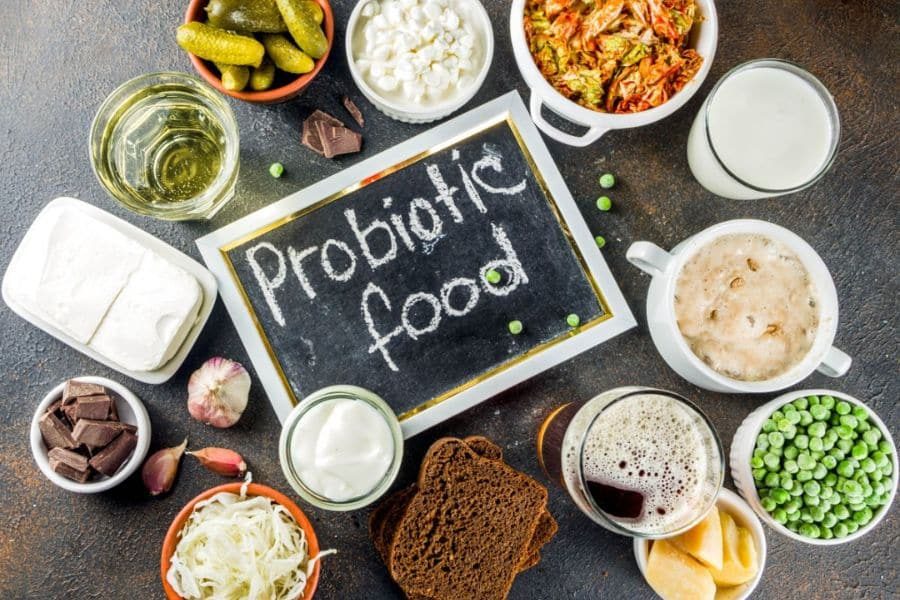Understanding Probiotics
Introduction to Probiotics
Hey there! Ever thought about what’s swimming around in your yogurt or that trendy kombucha drink? Well, those are not just tickling your taste buds but doing wonders for your gut. We’re talking about probiotics—tiny critters that play the hero when taken in the right amounts. You’ll find them in all kinds of goodies like yogurt, sauerkraut, kimchi, and yes, even in that swirly potion called kefir. Not into fermented foods? No worries, you can snag them in pill form, too.
According to the science buffs at the International Scientific Association for Probiotics and Prebiotics, probiotics are alive and kicking organisms that do your body good when you let them in. Mostly, they’re good bacteria and yeasts. But don’t worry, these aren’t the kind that will have you running to the doc (NIH Office of Dietary Supplements).
Some of the popular names you might hear in probiotic circles include:
- Lactobacillus
- Bifidobacterium
- Saccharomyces
- Streptococcus
- Enterococcus
- Escherichia
- Bacillus
These guys break down further into species with codes that scientists underline in their fancy labs (NIH Office of Dietary Supplements).
Benefits of Probiotics
So, what’s in it for you, you ask? Probiotics are like a friendly squad for your gut. Here’s what they can do for you:
-
Digestive Health Makeover: Probiotics can soothe your tummy troubles like bloating and keep things moving along. They’re a gut’s best friend. If your tummy needs some TLC, dive into probiotics for gut health.
-
Immune System Cheerleader: These little guys can pep up your immune system, helping it fend off nasties by boosting natural antibodies. Learn more about their immunity-boosting superpowers.
-
Boosting Your Vitamin Game: If soaking up vitamins and minerals was a contest, probiotics would definitely win. They help your body grab all those goodies efficiently.
-
Managing Digestive Drama: For those tangled in IBS or IBD woes, probiotics might ease the struggle.
-
Overall Mood Booster: Believe it or not, a happy gut can mean a happy mind. Regular probiotic intake has been linked t reducing anxiety and depression vibes because of the gut-brain connection.
Knowing these perks can help you see why probiotics might just be your new best dietary buddy. Whether you munch on fermented foods or reach for those probiotic supplements, they pack quite the punch.
| Benefit | Impact |
|---|---|
| Digestive Health | Calms the gut, cuts back on bloating |
| Immunity | Ramps up antibodies, revs immune cells |
| Nutrient Absorption | Boosts grab on vitamins and minerals |
| Gut Disorders | Tames the trouble from IBS and IBD |
| Mental Health | May ease anxiety and brighten mood |
For real results, you gotta pick the right type and amount of these good guys. Close to 4 million folks in the U.S. are already giving it a go and digging it (NCCIH). Curious about getting more specific? Don’t miss our articles on probiotics for women and probiotics for men.
Natural Sources of Probiotics
Guess what? Your gut’s best friend—probiotics—aren’t just lurking in expensive powders or supplements. They’re right there in some of the tastiest foods you can find. These little guys spruce up your digestion and keep your stomach doing a happy dance. So, let’s peek into where you can find them!
Yogurt
Picture this: creamy yogurt that’s not just a treat but a probiotic powerhouse! Packed with gut-loving bacteria like lactic acid bacteria and bifidobacteria, yogurt is a go-to for anyone looking to keep things running smooth in the belly department. Even if milk’s not your friend, yogurt might still high-five your tummy. It’s all about those versatile bites of goodness! (Healthline)
| Nutrient | Amount per 100g |
|---|---|
| Calories | 61 |
| Protein | 3.5g |
| Fat | 3.3g |
| Carbohydrates | 4.7g |
Check out more on our probiotics in yogurt page if you’re curious!
Kefir
Kefir, a drink that’s like yogurt’s sprightly cousin, is brimming with healthy bacteria and some funky yeast that your gut just loves. This fermented milk drink is great for your digestion and might even help your bones sing. It’s the kind of drink that defends you against those pesky infections too! (Healthline)
| Nutrient | Amount per 100g |
|---|---|
| Calories | 41 |
| Protein | 3.3g |
| Fat | 0.9g |
| Carbohydrates | 4.9g |
Fancy getting into the nitty-gritty of kefir? Visit our piece on probiotics for gut health.
Sauerkraut
Who knew cabbage could throw a party in your gut? Meet sauerkraut, the tangy sidekick to sausages everywhere. Packed with vitamins C, K, and loaded with fiber and iron, this fermented wonder comes with live bacteria that give your digestive system a thumbs-up. Plus, it adds a zesty kick to any plate! (Healthline)
| Nutrient | Amount per 100g |
|---|---|
| Calories | 19 |
| Protein | 1g |
| Fat | 0.14g |
| Carbohydrates | 4.28g |
Intrigued about diving deeper into probiotic eats? Swing by our page on probiotic supplements for more tasty tidbits.
Bringing these tasty, probiotic-rich foods into your meals could be just the thing your digestive track ordered. They’re easy to love and even easier to eat. Curious about other benefits? Don’t miss our probiotics benefits page for the full scoop.
Probiotics in Food
Sneaking probiotics into your daily munchies is like giving your belly a hug. Let’s chat about two goodies: Tempeh and DIY Fermented Foods.
Tempeh
Tempeh’s like a superhero made of soybeans! It’s been hanging out with special bacteria, making it a powerhouse of probiotics and protein. Your tummy will thank you for the improved digestion and mineral boost. And here’s a fun fact – Tempeh brings vitamin B12 to the table, usually missing from soybeans. Who woulda thunk it?
| Nutrient | Amount (per 100g) |
|---|---|
| Protein | 19g |
| Vitamin B12 | 0.1µg |
| Fiber | 7g |
This fermentation party in Tempeh also says bye-bye to phytic acid, helping your body soak up all those juicy minerals. So, it’s not just a probiotic pal but also a nutrient ninja.
Want to dig deeper into why probiotics rock? Check out our probiotics benefits guide.
Homemade Fermented Foods
Cranking out fermented yummies at home gives you a double whammy of fun and healthy eats. Things like kimchi, pickles, and kombucha are basically busy bee factories, turning food into belly-friendly bacteria.
| Fermented Food | Probiotic Content (CFUs)* |
|---|---|
| Homemade Sauerkraut (1 cup) | ~10 billion |
| Kimchi (1 cup) | ~5 billion |
| Kombucha (1 cup) | ~2 billion |
*CFUs = Colony Forming Units
Real talk – these foods do wonders for your gut and taste buds. Tossing homemade ferments into your meals can keep your gut bacteria doing a happy dance, which is just what you need for digestion, immunity, and feeling tip-top.
Need the full scoop on probiotics? Head over to our probiotics for gut health guide.
So, letting Tempeh and homemade fermented treats into your diet isn’t just good for the gut; it’s a tasty way to help your body chomp down nutrients and boost overall wellness. Craving more probiotic-packed ideas? Peek at our yogurt probiotics section.
Health Benefits of Probiotics
Hey there! Ever heard about probiotics, those little gut buddies of ours? Not just cool in science books, but they’re busy keeping your belly and immune system in tip-top shape! Let’s see how they work their magic.
Impact on Gut Health
Your tummy isn’t just about eating and groaning on the couch afterward! Probiotics are the tiny powerhouses that keep your digestive system running smoothly. Imagine them as little janitors who clean up the digestive mess and balance the good and bad bacteria in there (Healthline). Feeling bloated or running to the loo a bit too much? These guys have got your back. Add a spoonful of yogurt or a crunchy bite of homemade pickles to invite them over for a gut party!
The superhero strains like Lactobacillus and Bifidobacterium tackle bathroom issues like they’re solving mysteries. From stopping that annoying antibiotic-induced diarrhea to sorting out conditions like ulcerative colitis and infant colic, they’re the detectives your tummy needs (NIH Office of Dietary Supplements).
Keeping these foods in your munch menu makes sure your belly is never stuck in a horror movie plot twist. Dive deeper into the gut gossip at probiotics for gut health.
| Common Probiotic Strains | Health Benefits |
|---|---|
| Lactobacillus | Banishing diarrhea, cheering up IBS sufferers |
| Bifidobacterium | Wrestling with bloating, keeping bowels regular |
| Saccharomyces | Kicking yeast infections and antibiotic-associated diarrhea to the curb |
Immunity Boosting Effects
But wait, there’s more! Probiotics aren’t just about gut grins – they’re bodyguards for your immune system too. They boost your immune squad by cranking up those antibodies and rallying immune cells like T-cells and killer cells, which sound like video game bosses (Healthline).
When these friendly bugs join your team through your diet, they fight off those pesky germs and speed up your recovery after being sick. Some strains even give a hard time to the bugs causing respiratory infections, especially among kids (NIH Office of Dietary Supplements). Also, they’re pretty good at soothing skin woes like atopic dermatitis in children. Hooray for fewer skin itches!
| Immune Benefits | Mechanism |
|---|---|
| Pumped-up antibody levels | Reinforces your body’s defenses |
| Immune cell army | Fast tracks your infection response |
| Calmed eczema | Reduces inflammation and allergic drama |
Getting to know how probiotics can keep you feeling great means you can wisely decide how to sneak them into your eating habits. Whether you’re checking out probiotic supplements or sticking with the classics like tangy sauerkraut, these bacteria buddies do wonders for keeping you feeling fab!
Probiotic Supplements
Acidophilus
Ah, Acidophilus—one of the probiotic heroes, always ready to help keep your gut in check. This little fella, formally named L. acidophilus, thrives in different corners of your body and is like your personal squad for a balanced microbiome (Cleveland Clinic). It’s a top pick for making sure your belly stays happy and your gut flora throws a constant party.
You’ll spot Acidophilus in capsules, tablets, and powders, perfect for those who like options. Plus, yogurt, sauerkraut, and kimchi are jam-packed with it too. These foods are the real MVPs when it comes to a balanced diet.
What makes Acidophilus a rock star? It churns out lactic acid, making life tough for nasty bacteria while keeping the good guys strong. It also plays nice with your food, helping with nutrient absorption and keeping things running smooth.
Daily Intake Guidelines
How much probiotic power do you need? Well, the right amount of these mighty microbes can keep you feeling tip-top. Many find that a daily dose is key for keeping things running smoothly, be it supporting health, boosting your immune system, or maintaining regular trips to the loo (Cleveland Clinic).
| Probiotic Supplement | Suggested Daily Dose (CFUs) | Benefits |
|---|---|---|
| L. acidophilus | 1-10 billion | A friend for your digestion |
| Bifidobacterium spp. | 1-10 billion | Power-up for your immune defense |
| Lactobacillus rhamnosus | 1-10 billion | Helps keep your gut on track |
These figures are ballpark estimates—check the label or have a chat with a doc for what suits you best. A smidge too much could cause a case of the bloats or tummy grumbles. For a full scoop on what to watch out for, see Considerations and Risks.
Don’t forget to peep the storage tips on your probiotic bottles. Some need chilling to keep their mojo. Aim for a mix of strains to cover all your health bases.
Including Acidophilus or other probiotic strains in your meals or popping a supplement can bring a wave of wellness to your gut and more. Curious about how probiotics can supercharge you? Dive deeper into our guides on probiotics benefits and probiotics for gut health.
Considerations and Risks
Thinking about joining the probiotic club? Before spilling the beans, let’s chat about the fine print—those side effects and the stuff they don’t tell you on the yogurt label. Read on to make the best move for you and your insides when adding these bacteria buddies to your meals.
Side Effects of Probiotics
So, probiotics sound magical, right? They can be. But like most things, jumping in too quickly can ruffle some feathers (or upset your gut).
- Tummy Troubles: You might feel like a balloon or get grumbly in the tummy with gas or cramps while your body welcomes its new residents.
- Head Thumpers: Foods packed with probiotics like yogurt and kimchi might bring on a headache for some folks.
- Allergic Reactions: Some beneficial bugs can spark histamine—that stuff your body releases in response to allergens—causing allergic-like symptoms.
- Surprise Infections: Rarely, but it can happen, infections could crop up, especially if your immune defenses are taking a nap.
To keep things cool, introduce probiotics slowly and pay attention to how your body vibes with them. A chat with your doc before diving in can save some headaches—literally.
People Who Should Think Twice
For some, probiotics aren’t the party they’re invited to. Check out who might want to RSVP with caution.
- Weak Immune Peeps: If your immune system isn’t up to its usual strength, these live organisms might throw off more than just a party.
- Long Hospital Stayers: Got a long-term stay booked? Probiotics might not be the best roommate.
- Fresh from Surgery: If you’ve just been under the knife, beware of bringing in extras like probiotics too soon.
- Handling Acute Pancreatitis: If this is your jam, adding probiotics can create more trouble than it’s worth.
- Other Serious Health Bumps: Got an ongoing medical thing? Just check in with your healthcare group before throwing probiotics into the mix.
| Concerned Folks | Why They Should Pause |
|---|---|
| Weak Immune Peeps | Greater chance of getting infections |
| Long Hospital Stayers | Possible infections from entry points like catheters |
| Fresh from Surgery | Extra risks with healing |
| Handling Pancreatitis | Potential to worsen the condition |
| Serious Health Bumps | Consultation needed to avoid mix-ups |
If you’re in any of these camps, grab a moment with a healthcare pro for the lowdown on what’s best.
Going the probiotic route can jazz up your gut and overall groove, but don’t forget to be aware of what can go sideways. For more scoop on probiotic perks, see our guides on probiotics in food and probiotics in supplements.










